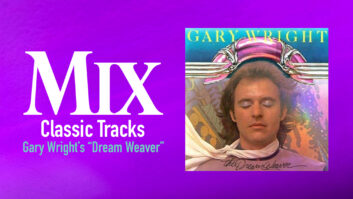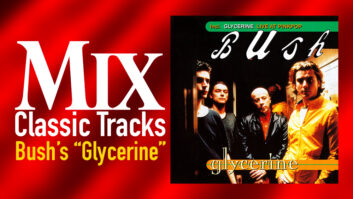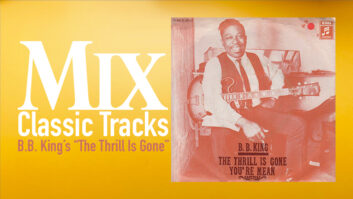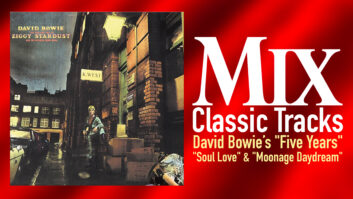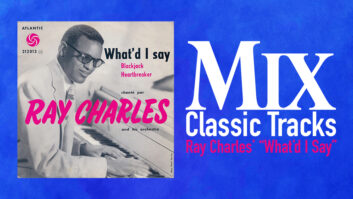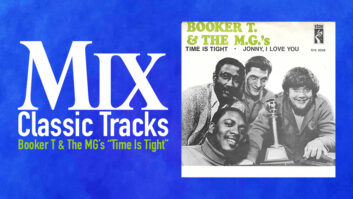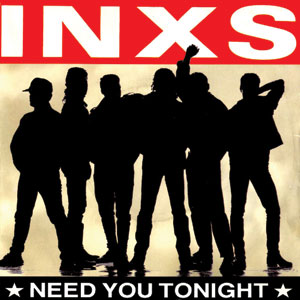
The Australian band INXS was always difficult to characterize. They arrived on the scene at the dawn of the ’80s as part of the New Wave; on their self-titled debut album, it’s easy to hear the influence of Joe Jackson, The Clash and Talking Heads in their punchy rock songs. But they also embraced and helped define early ’80s synth-pop, and as the decade progressed, R&B and funk textures became increasingly prominent in some of their songs. Talking Heads were an influence there, too, as was Chic mastermind Nile Rodgers.
In fact, Rodgers produced one song with INXS at the Power Station in NYC in September 1983—“Original Sin,” which appeared on the group’s 1984 disc The Swing and became a worldwide smash (except in the U.S. where the single reached Number 58; still a good showing). The rest of The Swing was cut with producer Nick Launay in England, and the album, too, was a great success, aided by the band touring nearly nonstop in the U.S., Europe and Australia during 1984, and their telegenic appeal on the still-new MTV network.
The following spring, INXS enlisted the great British producer Chris Thomas (Roxy Music, Sex Pistols, Pretenders, Pete Townshend, Elton John) to record their next album, Listen Like Thieves, at Rhinoceros Studios in Sydney, where the group was based. Rhinoceros was the hottest studio in Sydney in the ’80s; indeed, it is where INXS had made the 1982 album that first put them on the map internationally, Shabooh Shoobah, which contained the catchy hit single “The One Thing.” That album was produced by Mark Opitz and recorded by David Nicholas, who, with some partners, had literally built Rhinoceros from the ground up a few years earlier and stayed on as a co-owner and staff engineer.
Thomas had been an INXS fan for a while. As he noted in a 1998 Mix interview with myself and Chris Michie, “Oh, they were a great band! I remember before I worked with them seeing them at the Hollywood Palladium in 1984. That gig was incredible; it was one of the best gigs I ever saw by any band. God, they were good! Michael [Hutchence, lead singer] was absolutely brilliant. And the style of their music—it was funk but it was white and rock; a great mixture.” Listen Like Thieves produced INXS’s first Top 5 in America—“What You Need”—and the LP made it to Number 11 on Billboard’s Top 200 album chart and was another international blockbuster.
So it was no surprise when Thomas was tapped to produce the 1987 multi-Platinum follow-up album, Kick, source of this month’s Classic Track, “Need You Tonight,” the group’s lone U.S. Number One. Once again, Rhinoceros in Sydney was the site for most of the recording, but this time David Nicholas engineered, beginning a fruitful partnership with Thomas that lasted for the next eight years.
“Need You Tonight” has an interesting genesis. INXS’s principal music writer—guitarist/keyboardist Andrew Farriss—was waiting for a cab to take him to the airport so he could fly to Hong Kong for some writing sessions with lyricist Hutchence (who was living in Hong Kong at the time), when he had a flash of inspiration and immediately started laying down tracks on his Fostex 8-track.
“I used a Roland 707 drum machine to program the groove for what became ‘Need You Tonight,’” he says. “What’s on the record is pretty much exactly what I put into the drum machine. What I also tracked from memory was the guitar riff, the bass part—which I played on a keyboard bass—and there was a rhythm guitar part that never actually ended up on the record. There was something about it that sounded right in my head, so that’s why I made the cassette recording of it: ‘I don’t know what this thing is, but there’s something in it.’”
He grabbed the cassette, jumped into the waiting cab and raced to the airport in time to catch his flight. Once in Hong Kong, he drove directly to the Watson Estate, where he and Hutchence worked for the next two weeks on songs for Kick in a demo studio on the property. “The engineer there, whose name I don’t remember, had a good little setup with 2-inch 24-track, and besides the cassettes, I had taken my 707 drum machine with me,” Farriss recalls. “So we came up with the idea of re-creating what I had done [on the cassette demo] and that turned into ‘Need You Tonight.’” Hutchence flipped over the riff and came up with his pleading and sensual lyrics for it. “We also recorded two or three other pieces of music, including ‘Guns in the Sky’ and ‘Mediate’ [which is attached to “Need You Tonight” on Kick and has the identical bpm].”
Thomas and the rest of the group—Farriss’ brothers Jon (drums) and Tim (lead guitar), Kirk Pengilly (sax, guitar) and Garry Beers (bass)—loved what they heard on the 2-inch tape Hutchence and Farriss brought back from Hong Kong and set to work recording the songs in earnest at Rhinoceros. The studio’s unique LEDE control room boasted the first SSL in Australia—a 4000 that engineer Nicholas says one of the very early consoles the British company had made. “They were still hand-making them, and at that point it was really top-end. The mic pre’s were incredible, and the compressors and EQs were just beautiful. I think it had slightly higher-end components than the [later] production models. It was the nicest desk I’ve ever had, and I’d give my right arm to have it today.”
The Kick album was recorded to one of the early an Otari 32-track digital recorders, “but slaved to Studer 800 MK3, which saved our bacon a couple times when [the Otari] said it was recording but actually wasn’t,” Nicholas says.
“In those days, we were tracking everything live,” he continues, “so ‘Need You Tonight’ would have been the band playing it in the main room, and then there might have been some loops that Andrew had that we striped onto the machine, too. I remember the drum, bass and that main guitar part were all done live.”
Farriss adds, “We also had the 707 [drum machine beat] and an Emulator 2 sample of a bass sound I made up from a MIDI keyboard. The guitars were Fenders through some old Marshall amps. Jon would have had a Pearl [drum] kit of some sort and [Remo] Roto Toms. He did some cymbals, toms and fill stuff across the drum machine, as well. Garry added a bass part with a Fender Precision bass, and some of the guitar was overdubbed. It was important that the guitar work have the push-pull of people really playing—trying to get that aggression, that edginess, to come out.”
Jon Farriss was tucked into Rhinoceros’ very live-sounding wood-walled drum room, his kit miked with a Shure 57 on snare, Sennheiser 421s on the kick and the toms (top and bottom), AKG 414s for overheads, Neumann U89s as room mics, in addition to “a mono room; some sort of ribbon.” Additionally, two large Yamaha speakers placed behind the kit were occasionally employed to pump samples of claps, kick drum and other sounds into the room for Jon Farriss to play along with. “That way, the samples wouldn’t sound so different from the drum kit,” Nicholas says. “They’d come out sounding like they were in the room.”
In the ample main room, the guitar amps were baffled and Beers’ bass cabinet put in an airlock. Nicholas double-miked the amps with a FET 47 and a Beyer 201 in an X-Y, “ran them up equal level and put them through an 1176 [limiter], and bingo—that’s all it needed; no EQ.”
Hutchence sang some scratch vocals with the band, but his keeper leads were cut later. “We wanted the vocal to be very, very close,” Nicholas says, “so I came up with this idea of using two AKG 451s in an X-Y, so it would be stereo, and then I took a split from that and put it through a [Yamaha] Rev 7 and had it on ‘phase.’ Michael’s vocal track ended up being four tracks, so when it was mixed it sort of wrapped around your head. It sounded amazing. Michael was usually a couple of takes and that was it; we’d comp them together and away we went.” Though some of the lead vocals on Kick were recorded during a week of sessions at Studio de la Grand Armée in Paris later in the process, “Need You Tonight” was cut entirely at Rhinoceros.
Minimal processing was used during the tracking. Besides the SSL pre’s, compressors and EQs, the studio had 1176s, LA4s and reverbs and delays including the Lexicon 224X and the AMS RMX-16.
Kick was mixed on another SSL 4K in London’s Air Studios (the Oxford Street location) by Bob Clearmountain, who was perhaps the most influential rock mixer of the day, having worked on epic-sounding discs by the likes of the Rolling Stones, Bruce Springsteen, Chic, David Bowie, Pretenders, Roxy Music, Huey Lewis & the News, Tears for Fears and many others. “I knew the band,” he says. “I had talked to them a couple of times about doing something with them but it didn’t work out. I always liked them, and of course Chris was this amazing producer with incredible instincts.”
Starting with Thomas’ “somewhat mono-ish” automated rough mixes, Clearmountain says that his role was mostly “adding little delays, including some tape delays, panning things more and expanding the dynamics he had already achieved. One of the things that’s fantastic about that album is it doesn’t just sit there. It jumps out and grabs you. I was totally knocked out by ‘Need You Tonight.’ That was an obvious single, as was ‘New Sensation.’ I remember going to work on the tube [the subway] in the morning and I couldn’t get ‘Need You Tonight’ out of my head. It was a fun time to be in London and working with that band.”
Speaking more generally about the making of the album, Nicholas says, “There was a really good feeling in the studio that this was going to be something big. The band had just come off a really successful tour of the U.S. on the back of Listen Like Thieves—which really broke them there—and they were on fire. They were in great form and all the planets were aligned. Chris and I were working well together, the band was happy and it was fun. When you make a record and you have a great time in the studio every day, it comes out on the record.”
“Need You Tonight” hit Number One in the U.S. in the fall of 1987 and was followed by three more Top 10 singles from Kick—“Devil Inside,” “New Sensation” and “Never Tear Us Apart.” The album made it to Number 3, selling more than 6 million copies in the U.S. alone. The 170-date support tour played to more than 3 million people worldwide.
A new, deluxe 25th anniversary Kick box set contains three CDs of music (lot of demos, B-sides, live tracks and remixes); a DVD with promo videos, a making-of documentary and rough “home movie” video tour footage; and a beautiful 80-page hardcover book about the album. There is also a two-CD music-only anniversary set and a limited edition red vinyl release available.


